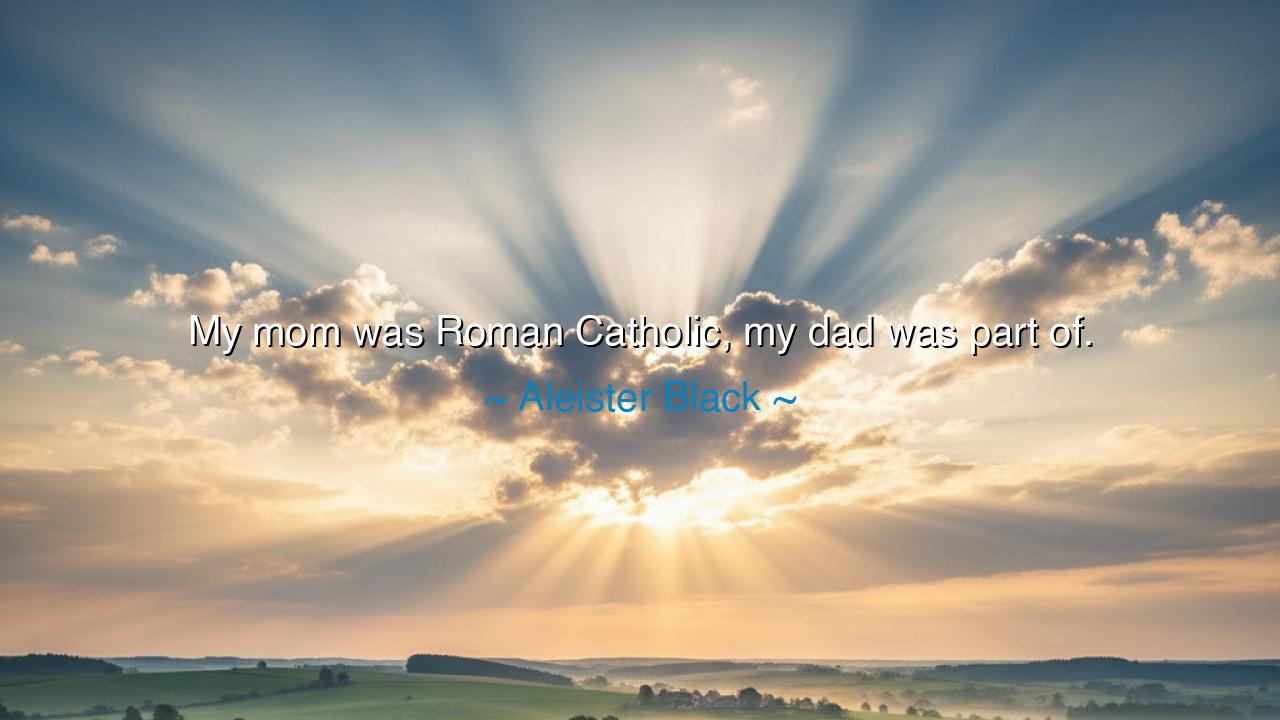
My mom was Roman Catholic, my dad was part of.






"My mom was Roman Catholic, my dad was part of." — Aleister Black
In these fragmented yet profound words, Aleister Black—the modern warrior of the wrestling ring and philosopher of the shadowed heart—offers a glimpse into the conflict and complexity of heritage. His statement, incomplete as it seems, is not a lack of thought but a reflection of the very tension it describes. It speaks of the meeting of two worlds: the mother’s faith, steadfast and traditional, and the father’s difference, mysterious and undefined. Between them stands the child, born into a crossroads of belief and identity, learning early that truth is seldom one-sided, and that understanding often grows in the space between opposites.
The origin of this quote lies in the story of Aleister Black himself—born Tom Budgen in the Netherlands, raised in a home divided by contrasting spiritual views. His mother, a Roman Catholic, rooted in ritual and reverence; his father, drawn toward darker, esoteric traditions—perhaps paganism, perhaps the occult, perhaps simply a questioning of what others accept as absolute. Out of this union emerged a son destined to wrestle not only in arenas of sport, but within the arena of the soul. The quote, therefore, is less about religion than it is about the duality of inheritance, the struggle every human faces between light and shadow, faith and freedom, belonging and individuality.
To be born between two beliefs is to be given both burden and blessing. It is to hear the voices of angels and skeptics at once, and to decide which song will guide your steps. Aleister’s words, though brief, echo the ancient truth that wisdom begins in contradiction. The Roman Catholic mother gives him structure, morality, and the sacred language of redemption. The father’s mystery gives him curiosity, rebellion, and the courage to seek his own truth. From the tension of these forces, the spirit awakens. For it is not certainty that refines a soul—it is the struggle to reconcile what seems irreconcilable.
History, too, bears witness to those shaped by divided paths. Consider Augustine of Hippo, born to a devout Christian mother and a pagan father. He wandered through doubt and indulgence before finding faith strong enough to write The Confessions and The City of God, works that still move the hearts of seekers across centuries. Like Aleister Black, Augustine was a child of dual heritage, torn between belief and reason, between his mother’s prayers and his father’s freedom. But it was through that inner battle—not despite it—that he found greatness. Conflict, when met with reflection, becomes the forge of enlightenment.
Thus, the quote reminds us that our origins are not prisons—they are beginnings. The faith of one parent and the doubt of another need not divide us; they can deepen us. To understand the world, one must first learn to understand both its shadows and its light. Aleister Black’s life and art, steeped in symbolism and ritual, show how a man may honor both—the sacred discipline of the mother and the restless spirit of the father—and through their union, create something entirely his own. The dual heritage becomes not confusion, but creation.
And yet, the lesson reaches beyond religion or family. It speaks to anyone who has stood between two worlds—between tradition and change, between the old and the new, between who they were told to be and who they must become. The wise do not curse the conflict; they listen to it. They do not reject one side to embrace the other; they integrate them, as day and night share the same horizon. The harmony of opposites, said the ancients, is the foundation of all creation.
So, my child of tomorrow, when you find yourself divided between paths, remember this: you are not the sum of your contradictions—you are the bridge between them. Embrace the discipline of the mother and the mystery of the father. Seek not to silence one voice, but to let both speak through you until they form a single truth. For as Aleister Black reminds us in his quiet, cryptic way, greatness is not found in certainty, but in the courage to stand in the middle of paradox—and to make peace there.






AAdministratorAdministrator
Welcome, honored guests. Please leave a comment, we will respond soon